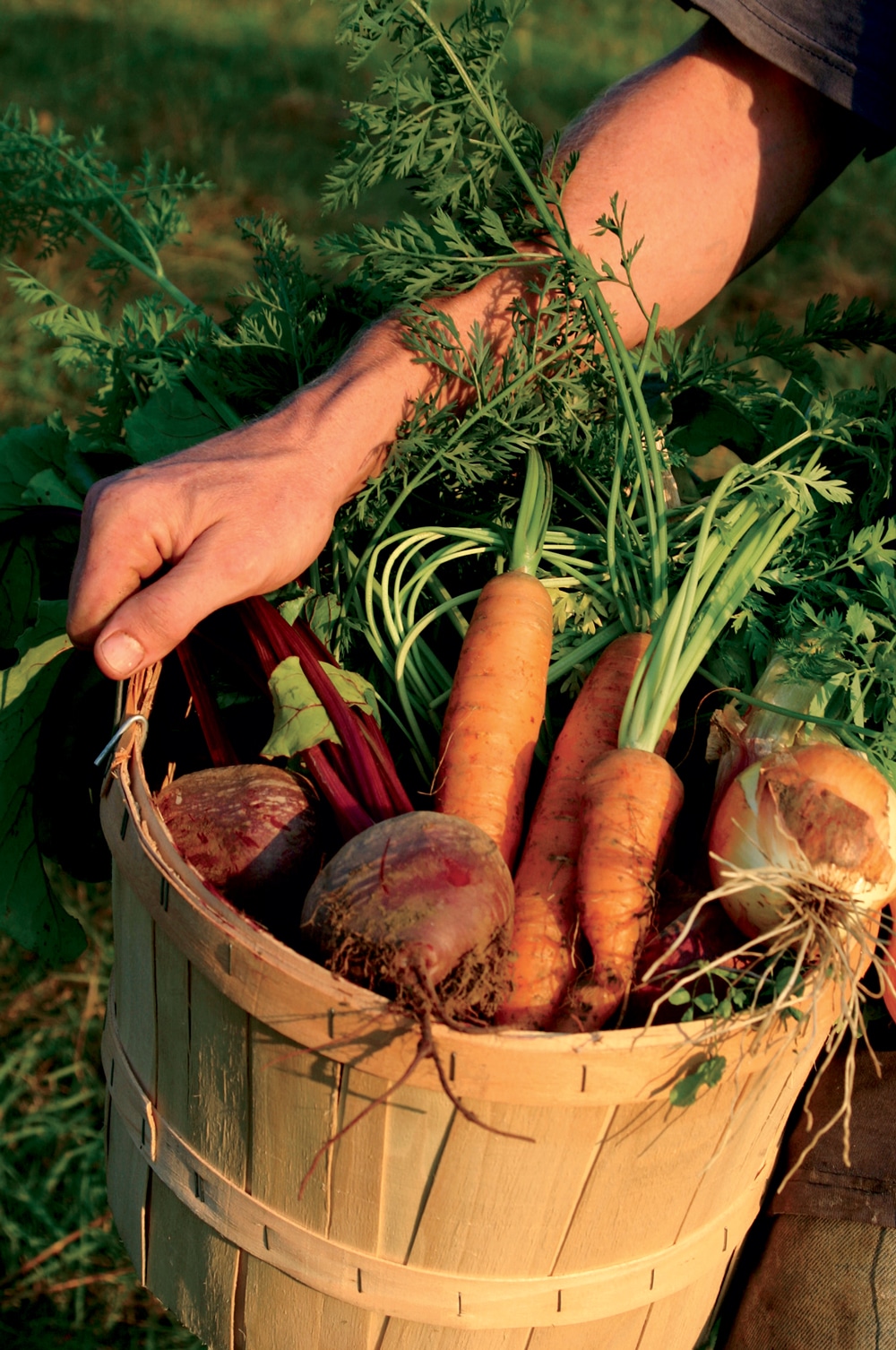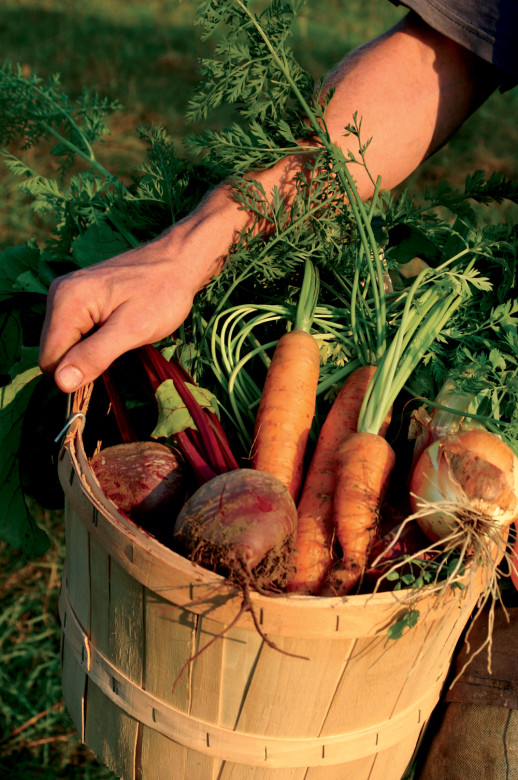
On the Hewitt farm, the garden haul does double duty: filling the summer table and stocking the winter pantry.
Photo Credit : Penny HewittWe’re not at the fair for the rides, although the Tilt-a-Whirl gyrating in the distance proves a brief temptation. Rather, we’ve come to see the hard-rock band ZZ Top, best known for the classic hit “Cheap Sunglasses” (When you get up in the morning and the light it hurts your head / The first thing you do when you get up out of bed / Is hit that street a-runnin’ and try to beat the masses / And go get yourself some cheap sunglasses … and then the requisite oh yeah, oh yeah, oh yeah).
Let me be honest: I never was much of a ZZ Top fan, and the prospect of spending an hour and a half watching a trio of geriatric rockers churn through their catalog of greatest hits does not fill me with unbridled enthusiasm. But Fin is 14 and an avid blues-rock guitar player; furthermore, he’s afflicted with the entirely rational fear that all the classic rock bands will have died off before he’s had an opportunity to see them. So I agreed to take him. Besides, it’s healthy to get off the homestead every once in a while, if only to see what’s happening in the world beyond.
There is something about a modern fair that feels a little desperate to me. As we stroll through the midway before the concert, the air is pungent with the smell of cigarette smoke and fried dough, punctuated every so often by a whiff of cheap perfume. We enter the concert venue, and for a while we just stand and watch. In the background, behind the nosebleed bleacher seats (we sprang for slightly better floor seating), the rides continue whirling unabated. A dozen or so feet to our right, a middle-aged couple is making out with unrestrained fervor. On our left, a 20-something fellow is smoking. I catch a glimpse of his T-shirt: Camping without beer is just sitting in the woods.
Truthfully, I’m caught off guard by the cheapness and excess of it all. So many lights flashing, so much noise. So many people. And ZZ Top themselves: such a strange—and strangely compelling—band. Billy and Dusty, the guitarist and the bassist, respectively, wear long, impeccably groomed beards, matching fedora-style hats, and, naturally, dark sunglasses. Frank the drummer is barely visible behind his gargantuan set of drums. In addition to sunglasses, they sing of Cadillac cars, the female anatomy, and the female anatomy in Cadillac cars, all laid over a raunchy and infectious blues shuffle. It is music that asks little of its listeners but for them to shake their butts and sing along. But then, I suppose that’s part of the appeal.
It’s a fairly short set, and who can blame them? The band got together in 1969; they’ve been at it since before I was born. They are old, and presumably rich, and I can only guess how many of these shows they’ve played, how many adoring crowds they’ve seen, buzzed on overpriced beer and menthol cigarettes. As we watch and listen, I imagine them gazing out over this crowd from behind their shaded lenses. What are they thinking of? The end of the show. Sleep. The ache in their hips. Home. Or maybe they’re just wondering how much longer their ride can possibly last.
Back home, the garden is coming on strong after a spring and summer of near-ideal weather. While southern New England has suffered from drought, we’ve received rain at precisely the right intervals, in precisely the right quantities. Still, since it’s our first year growing in this soil, we harbor minimal expectations. We trucked in load after load of compost from our previous homestead, but there’s really no way of knowing how things will turn out.

Photo Credit : Penny Hewitt
Fortunately, the early report seems to be “pretty darn good.” We snatch early potatoes, cube and steam them, then drown them in fresh-churned butter. Every day there are bountiful salads, composed of greens harvested only minutes before consumption. Thanks to a dozen or so mature blueberry bushes that were planted by the previous owner of this land, we even have fresh blueberries. The carrots are looking good, and the tomatoes carry the early blush of ripening. And then there are the green beans. It’s overwhelming, really, how quickly they grow. On hot, sunny days following rain, we pick every day, filling basket after basket after basket.
It is strange, during the height of summer, to find my mind turning toward winter. I should be accustomed to it by now: Living seasonally in a four-season climate means living with one foot in the present and the other in the season to come, and maybe even the season after that. While we eat plenty of veggies straight from the garden, the majority of the harvest will be preserved for the winter months. And though I’m loath to admit it in such a public space as this, there is still firewood to split and stack. This is not good. Nothing short of using a kiln will transform green wood to dry in two months, never mind that at this time of year, drying conditions deteriorate with every passing day. We’ll be burning greenish wood over the coming winter, and I’m not sure which is worse: the prospect of sputtering fires or the hit to my pride.
As the harvest continues, I watch the pantry shelves fill. It’s a comforting sight, diminished only slightly by the fact that the shelves are actually bowing a bit in their middles. Crud. I’ll have to add some supports before we get too much further into the preserving season. Another task to add to the list. In many ways, the pantry is the most important room in our home: It harbors the distilled efforts of the growing season, and by the time the first snow falls, those newly reinforced shelves will hold literally thousands of dollars’ worth of food, the nourishment our family will rely on for the next six months, until the sun returns, the snow melts, and it starts all over again.
In the weeks immediately following my journey to the fair with my son, every so often—usually at the most incongruous times, as when I’m splitting wood, or picking still more green beans—I think back to that evening. I’m not sorry to have gone, in part because I cannot resist an outing with one or both of my children, but also in part because it served as an unlikely reminder of the unadorned beauty that quietly inhabits my day-to-day life.
When this happens, I realize I have become jaded. Not exactly blind to this quiet beauty, but not fully present to it either, not always mindful enough to appreciate it in full: those ripening tomatoes, pale red against the dark garden soil. The sweet scent of a fresh-split round of sugar maple, subtle enough that I almost doubt it even exists, which in a strange way makes it even more alluring. The sound of the maul falling against the wood, and even, if I really pay attention, the sound it makes moving through the air.
Even those green beans. I curse them, I do—there are so many of them, and there are so, so many other things wanting my attention. But if I think about it even a little, I like the way they feel in my hands, the surface of them smooth in my firewood-rough palms. And the green is amazing: It’s the color in a dream about green, the only green Crayola would offer if they had a lick of sense. In a few short months, when the air is cold and the land rests under a fleece of snow, I’ll pull these beans from the freezer. Already, I know what I’ll do in that moment: I’ll stand there for a second or two, just looking at them, remembering the season before.


